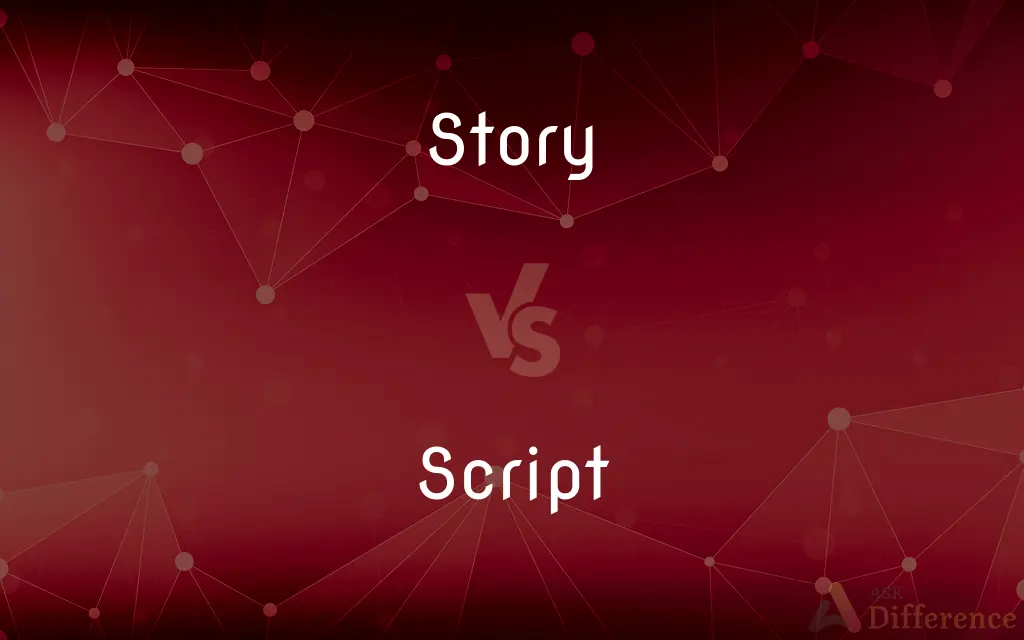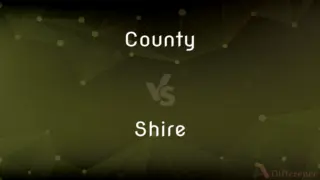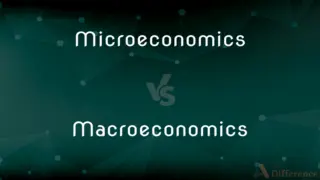Story vs. Script — What's the Difference?
By Fiza Rafique & Urooj Arif — Updated on April 18, 2024
Story is the narrative content and structure of an event sequence, while script is a written blueprint detailing dialogue, actions, and directions for visual storytelling.

Difference Between Story and Script
Table of Contents
ADVERTISEMENT
Key Differences
A story is the foundational narrative arc encompassing the events, characters, and settings within any tale, whether it is told in a book, movie, or play. Whereas a script is specifically formatted to guide the production of a play, film, or television show, including explicit dialogue and stage or camera directions.
Stories exist in many forms, such as novels, folklore, and even non-verbal mediums like dance. On the other hand, scripts are primarily written documents that provide detailed scenes, character interactions, and sometimes technical instructions for actors and directors.
A story can be conveyed through simple telling or through complex multimedia experiences, focusing primarily on plot and character development. In contrast, a script not only conveys the story but also integrates specific instructions for how the story should be visually and auditorially presented.
The creation of a story involves imagining characters, settings, and a sequence of events that form a compelling narrative. Whereas, scriptwriting translates a story into a format usable by filmmakers or theater producers, often including cues for performance or camera work.
While a story might evolve organically as it is told or written, a script undergoes revisions and must adapt to practical constraints of filmmaking or theater production, such as actor interpretations, directorial vision, and logistical considerations.
ADVERTISEMENT
Comparison Chart
Definition
A narrative of real or fictional events.
A written document for enacting a story in film, TV, or theater.
Purpose
To entertain, educate, or convey themes.
To guide production with dialogue and directions.
Format
Can be written, spoken, or visual.
Written format with specific layout for directions and dialogue.
Flexibility
Flexible in presentation.
Structured for production needs.
Audience
Readers, listeners, or viewers.
Directors, actors, and production crews.
Compare with Definitions
Story
Narrative.
The narrative of her journey was both engaging and enlightening.
Script
Acts.
The script divides the narrative into three acts, each escalating in conflict.
Story
Setting.
The setting shifts from a bustling city to a quiet countryside.
Script
Dialogue.
The script's dialogue accurately captures the era’s vernacular.
Story
Plot.
The plot thickens as the hero discovers the villain’s true identity.
Script
Stage Directions.
The script included stage directions for a dramatic exit.
Story
Characters.
Characters in his stories often face moral dilemmas.
Script
Scenes.
Each scene in the script builds tension leading to the climax.
Story
Theme.
The theme of redemption echoes throughout the story.
Script
Screenplay.
The screenplay adaptation added scenes not found in the original book.
Story
An account of imaginary or real people and events told for entertainment
I'm going to tell you a story
An adventure story
Script
Handwriting.
Story
An account of past events in someone's life or in the development of something
The film is based on a true story
The story of modern farming
Script
A style of writing with cursive characters.
Story
The commercial prospects or circumstances of a particular company
The investors' flight to profitable businesses with solid stories
Script
A particular system of writing
Cuneiform script.
Story
Variant spelling of storey
Script
A style of type that imitates handwriting.
Story
An account or report regarding the facts of an event or group of events
The witness changed her story under questioning.
Script
The matter set in this type.
Story
An anecdote
Came back from the trip with some good stories.
Script
The text of a play, broadcast, or movie.
Story
A lie
Told us a story about the dog eating the cookies.
Script
A copy of a text used by a director or performer.
Story
A usually fictional prose or verse narrative intended to interest or amuse the hearer or reader; a tale.
Script
(Law) The original of a legal instrument, as opposed to a copy.
Story
A short story.
Script
(Computers) A simple program in a language that the computer must convert to machine language each time the program is run.
Story
The plot of a narrative or dramatic work.
Script
To prepare (a text) for filming or broadcasting.
Story
A news article or broadcast.
Script
To arrange, direct, or control (an event or a person) as if supplying a script
"the brilliant, charming, judicial moderate scripted by his White House fans" (Ellen Goodman).
Story
Something viewed as or providing material for a literary or journalistic treatment
"He was colorful, he was charismatic, he was controversial, he was a good story" (Terry Ann Knopf).
Script
(Computers) To write (code) for a program.
Story
The background information regarding something
What's the story on these unpaid bills?.
Script
A writing; a written document.
Story
Romantic legend or tradition
A hero known to us in story.
Script
Written characters; style of writing.
Story
A complete horizontal division of a building, constituting the area between two adjacent floors.
Script
(typography) Type made in imitation of handwriting.
Story
The set of rooms on the same floor of a building.
Script
An original instrument or document.
Story
To decorate with scenes representing historical or legendary events.
Script
(countable) The written document containing the dialogue and action for a drama; the text of a stage play, movie, or other performance. Especially, the final form used for the performance itself.
Story
(Archaic) To tell as a story.
Script
(computing) A file containing a list of user commands, allowing them to be invoked once to execute in sequence.
Story
An account of real or fictional events.
The book tells the story of two roommates.
Script
(psychology) A behavioral script; sequence of actions in a given situation.
Story
A lie, fiction.
You’ve been telling stories again, haven’t you?
Script
(linguistics) A system of writing adapted to a particular language or set of languages.
Story
A soap opera.
What will she do without being able to watch her stories?
Script
(informal) prescription for drugs or medicine
Story
(obsolete) History.
Script
(transitive) To make or write a script.
Story
A sequence of events, or a situation, such as might be related in an account.
What's the story with him?
I tried it again; same story, no error message, nothing happened.
Script
(transitive) To devise, concoct, or contrive.
Story
A chronological collection of pictures or short videos published by a user on an application or website that is typically only available for a short period.
Script
A writing; a written document.
Story
(computing) user story
Script
Type made in imitation of handwriting.
Story
To tell as a story; to relate or narrate about.
Script
An original instrument or document.
Story
A set of rooms on the same floor or level; a floor, or the space between two floors. Also, a horizontal division of a building's exterior considered architecturally, which need not correspond exactly with the stories within.
Script
Written characters; style of writing.
Story
A narration or recital of that which has occurred; a description of past events; a history; a statement; a record.
One malcontent who did indeed get a name in story.
Venice, with its unique city and its Impressive story.
The four great monarchies make the subject of ancient story.
Script
A written version of a play or other dramatic composition; used in preparing for a performance
Story
The relation of an incident or minor event; a short narrative; a tale; especially, a fictitious narrative less elaborate than a novel; a short romance.
Script
Something written by hand;
She recognized his handwriting
His hand was illegible
Story
A euphemism or child's word for "a lie;" a fib; as, to tell a story.
Script
A particular orthography or writing system
Story
To tell in historical relation; to make the subject of a story; to narrate or describe in story.
How worthy he is I will leave to appear hereafter, rather than story him in his own hearing.
It is storied of the brazen colossus in Rhodes, that it was seventy cubits high.
Script
Write a script for;
The playwright scripted the movie
Story
A message that tells the particulars of an act or occurrence or course of events; presented in writing or drama or cinema or as a radio or television program;
His narrative was interesting
Disney's stories entertain adults as well as children
Story
A piece of fiction that narrates a chain of related events;
He writes stories for the magazines
Story
Structure consisting of a room or set of rooms comprising a single level of a multilevel building;
What level is the office on?
Story
A record or narrative description of past events;
A history of France
He gave an inaccurate account of the plot to kill the president
The story of exposure to lead
Story
A short account of the news;
The report of his speech
The story was on the 11 o'clock news
The account of his speech that was given on the evening news made the governor furious
Story
A trivial lie;
He told a fib about eating his spinach
How can I stop my child from telling stories?
Common Curiosities
What is the main purpose of a story?
To convey a sequence of events that expresses themes or entertains.
What elements are unique to stories?
Stories may include abstract themes, morals, and conceptual narratives not confined by practical execution.
Can a script exist without a story?
No, a script is a formatted representation of a story, specifically for production.
Why is flexibility important in a story?
Flexibility allows stories to adapt across various cultures and media.
What are the constraints of a script in production?
Scripts must consider the practicalities of production, such as budget, locations, and actor capabilities.
How do stories and scripts influence each other?
Stories provide the content and themes that scripts format for visual storytelling.
Is it necessary for scriptwriters to create original stories?
Not necessarily; scriptwriters often adapt existing stories into scripts.
How are scripts formatted differently from other forms of writing?
Scripts include specific elements like camera angles, technical cues, and blocking instructions, unlike prose or poetry.
Can a script be considered a form of literary art?
Yes, scripts are recognized as a form of literary art due to their storytelling and structural complexities.
How does a script support filmmaking?
It provides detailed instructions on dialogue, character interaction, and visual presentation.
What skills are essential for story writing compared to scriptwriting?
Story writing requires imaginative narrative skills, while scriptwriting requires an understanding of visual and dramatic structuring.
Share Your Discovery

Previous Comparison
County vs. Shire
Next Comparison
Microeconomics vs. MacroeconomicsAuthor Spotlight
Written by
Fiza RafiqueFiza Rafique is a skilled content writer at AskDifference.com, where she meticulously refines and enhances written pieces. Drawing from her vast editorial expertise, Fiza ensures clarity, accuracy, and precision in every article. Passionate about language, she continually seeks to elevate the quality of content for readers worldwide.
Co-written by
Urooj ArifUrooj is a skilled content writer at Ask Difference, known for her exceptional ability to simplify complex topics into engaging and informative content. With a passion for research and a flair for clear, concise writing, she consistently delivers articles that resonate with our diverse audience.














































